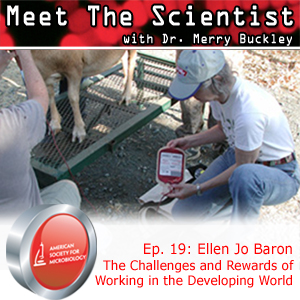MTS19 - Ellen Jo Baron - The Challenges and Rewards of Working in the Developing World

Dr. Ellen Jo Baron is a professor of pathology and director of clinical microbiology at Stanford University\u2019s medical center in Palo Alto, California.\xa0 A co-author of the authoritative Manual of Clinical Microbiology, Dr. Baron and her staff in the clinical lab evaluate and advise in the development of new diagnostic technologies.\xa0 Dr. Baron has also volunteered her time as a microbiology advisor in numerous hospitals and clinics in developing countries since 1996.
\nIn a hospital, you have to be able to diagnose infections in order to treat patients, but hospitals in the developing world that are forced to get along with inadequate and ill-equipped microbiology labs have to treat infectious disease blindly, without full knowledge of which organism is to blame and which drugs will be most effective.\xa0 These missteps cost lives.\xa0 Dr. Baron, who normally works in a modern, fully-equipped western hospital, travels to hospitals and clinics in places like Cambodia and Nepal to train staff and organize clinical microbiology labs.\xa0 She says it\u2019s not always feel-good work for her: cumbersome bureaucracy and lack of money and equipment are constant challenges.\xa0 But experiencing other cultures and getting out of her comfort zone help make the work rewarding.
In this episode, Dr. Merry Buckley talks with Dr. Baron about her work at home and abroad, the kinds of problems she faces in under-resourced labs, and about how, as a result of her work in the developing world, she now knows more about sheep and goats than she ever really wanted to know.